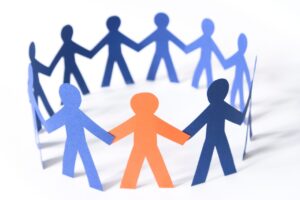How Effective Are 12 Step Support Groups?
When you seek to be successful at stopping addiction, the rate of success becomes important in treatment. Just how effective are 12 Step support groups? Has the research been done to prove the rate of success?
As an evidence-based treatment, 12 Step groups do indeed help men and women overcome addictions. It’s challenging to know exact numbers due to the anonymity of the groups and hesitation for some to admit relapses. However, most counsellors and rehab experts state that they’ve witnessed plenty of “12-Steppers” stop drinking or drugging and go on to live productive, sober lives.
Success rates vary from source to source, with:
- AA’s Big Book declaring that about 50 percent of members remain sober.
- A paper in the Journal of Addictive Diseases found that 70 percent of their study participants
who attended a 12-Step support group weekly were still sober two years later.
Addiction experts assert that those who consistently attend 12-Step meetings, especially early in
recovery, have a higher chance of remaining sober long-term. Attending an alcohol or drug treatment
center boosts the chance of success even greater.

12 Step Groups And Addiction Recovery Rehabs
There are plenty of addiction recovery rehabs in the US and Canada that combine the 12 Step principles with other evidence-based recovery treatments. With the combination of addiction treatment professionals with 12 Step members who understand addiction and recovery first-hand, the rate of success increases greatly.
What Is Learned In 12 Step Groups?
Attending 12 Step groups regularly gives you the opportunity to learn valuable life lessons. You’ll be able to learn how to recognize and contend with cravings or triggers, work at healing emotional wounds, and practice responsibility for your entire life. You’ll have the opportunity to forgive yourself and others, make amends to those you’ve hurt, and encourage others along the way. By working through the steps, you’ll awaken more to your true self, as well as your Higher Power.
The 12 Step Recovery movement has been around for many years. Today, there are dozens of 12 Step programs that help millions of people around the world recovery from addiction. Alcoholics Anonymous (AA) was started in 1935 and Narcotics Anonymous (NA) was started in 1953. Since then, nearly one hundred 12 Step programs have been created that help treats various addictions, including gambling, sex, porn, food, shopping, shoplifters, and more.
Most 12 Step programs offer free meetings in the community, though some cater more to those who want to attend meetings virtually online. This works well for those who aren’t able to get out readily or who live in areas where their particular support group is not offered in the community.
Regardless of whether the meetings are online or in the community, the gist of each meeting is men and women showing up to be encouraged, learn about addiction recovery, and share their experiences, strength, and hope for others.
The 12 Steps Of Support Groups
As you probably know, 12 Step groups focus on 12 Steps toward recovery. These guiding principles, when followed, have been saving men and women from addiction for many years. Millions of people have walked into the “rooms” of these meetings feeling defeated and ashamed. However, by working the program, and that includes working through the Steps, they’ve been able to get free from addiction and go on to create a better life.
Want to see AA’s 12 Steps? Visit here: Alcoholics Anonymous 12 Steps
How Do 12 Step Groups Work?
Most 12 Step support groups are structured around the original AA’s guiding principles. There are 12 “steps” that members are encouraged to climb as they progress on their recovery path. If you’re interested in attending a 12 Step program, it’ll help you understand better what occurs at meetings. First, the meetings are free. They may pass a plate around for donations for dues and fees, but you don’t have to put anything in. Those that feel led usually put in a dollar or two.
The meetings open up with a chairperson reading some 12 Step literature. The rules may be read at this time. Once the logistics are completed, the meeting typically opens for anyone to share. Those that are struggling with intense cravings or a crisis are encouraged to share so that they can receive support.
Each person that shares is encouraged to be mindful that others may want to share too. In other words, hogging the whole meeting to talk is frowned upon. Meetings usually last one hour, but sometimes go over a bit. Crosstalking, which essentially means giving advice, is discouraged at meetings. People can share their experiences and encourage others, but no advice-giving.
Sponsorship
One tool that 12 Step groups have that members report helps them tremendously is sponsorship. A sponsor is someone in the meeting that has a decent amount of “clean time” or sobriety under their belt and they’re actively working the program. Typically, this means over a year but is not limited to.
Newcomers that start attending meetings are encouraged to get a sponsor and work the 12 Steps with them consistently. You can get a sponsor by asking around for those who are open to taking on new sponsees, and simply asking someone that you feel you would resonate with.
There’s a saying in 12 Step programs that says, “It works if you work it”. This means that if a member really works hard in the program, attending consistent meetings and working the Steps with a sponsor, they’re quite likely to recover from addiction. Leaning on a sponsor is recommended, especially during the early days of recovery. In fact, many sponsors ask sponsees to call or text them daily, checking in and becoming accountable for their recovery. They may also encourage newcomers to attend 90 meetings in 90 days, which has proven to be helpful for many 12 Step members.

Joining A 12-Step Support Group
If you or a loved one are struggling with an addiction to alcohol or drugs, consider reaching out for help. There are more than 115,000 AA groups and over 63,000 NA groups around the world. There are also many other types of recovery groups.
In many cities, there are meetings scheduled at various times throughout the days and evenings. To find out more or locate a meeting near you, visit Alcoholics Anonymous or Narcotics Anonymous.